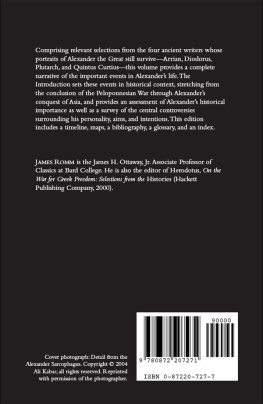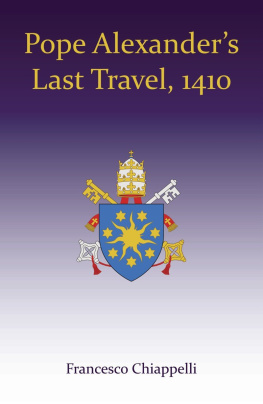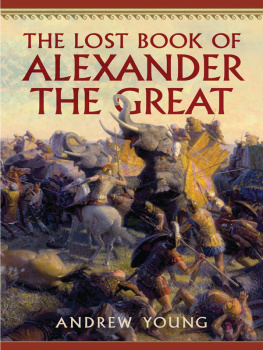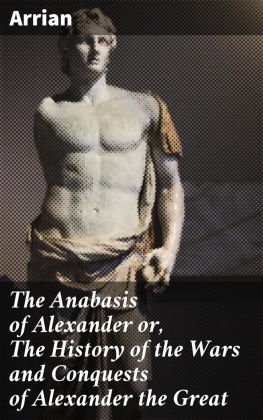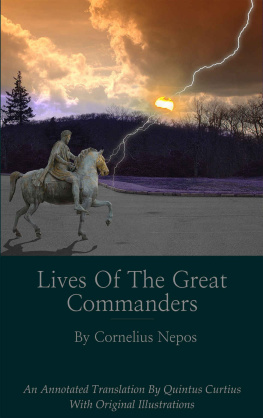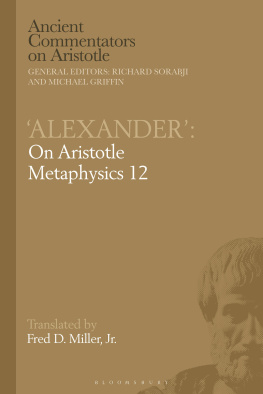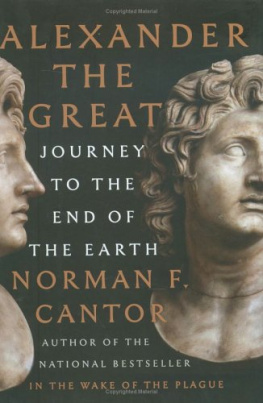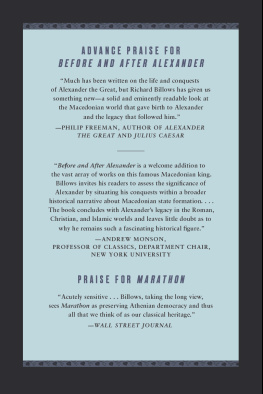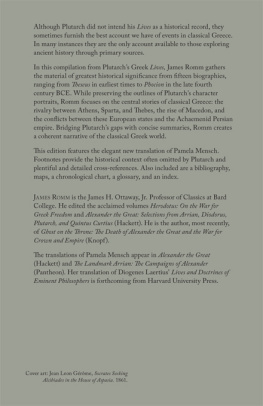Herodotus: On the War for Greek Freedom, translated by Samuel Shirley
Thucydides: On Justice, Power, and Human Nature, translated by Pual Woodruff
Plutarch: Lives that Made Greek History, edited by James Romm, translated by Pamela Mensch
Suetonius: The Caesars, translated by Donna W. Hurley
ALEXANDER
THE GREAT
Selections from Arrian,
Diodorus, Plutarch, and Quintus Curtius
Edited, with Introduction, by
James Romm
Translated by Pamela Mensch and James Romm
Hackett Publishing Company, Inc.
Indianapolis/Cambridge
Copyright 2005 by Hackett Publishing Company, Inc.
All rights reserved
Printed in the United States of America
15 14 13 12 11 2 3 4 5 6 7
For further information, please address:
Hackett Publishing Company, Inc.
P.O. Box 44937
Indianapolis, IN 46244-0937
www.hackettpublishing.com
Cover design by Abigail Coyle, Deborah Wilkes, and Lance Brisbois
Text design by Meera Dash
Composition by Agnews, Inc.
Printed at Versa Press, Inc.
Library of Congress Cataloging-in-Publication Data
Alexander the Great : selections from Arrian, Diodorus, Plutarch, and Quintus Curtius / edited, with introduction, by James Romm ; translated by Pamela Mensch and James Romm.
p. cm.
Includes bibliographical references and index.
ISBN 0-87220-728-5 (cloth) ISBN 0-87220-727-7 (pbk.)
1. Alexander, the Great, 356323 B.C. 2. GreeceHistoryMacedonian Expansion, 359323 B.C. 3. GeneralsGreeceBiography. 4. GreeceKings and rulersBiography. 5. GreeceHistoryMacedonian Expansion, 359323 B.C. I. Arrian. II. Romm, James S. III. Mensch, Pamela, 1956
DF234.A4895 2005
938'.07'092dc22
2004019818
ISBN-13: 978-0-87220-728-8 (cloth)
ISBN-13: 978-0-87220-727-1 (pbk.)
ePub ISBN: 978-1-62466-027-6
Few historical figures have been the subject of as much disagreement and dispute as Alexander the Great. Within the past sixty years alone, he has been portrayed as an enlightened humanitarian promoting universal brotherhood and as a bloodthirsty tyrant of Hitlerian proportions, and many things in between the two extremes. His phenomenal military talents and physical fortitude are beyond dispute, as is the immensity of the changes he wrought over large stretches of the inhabited world. But questions of what kind of person he was, what motivated him to undertake his campaign of conquest, and what plans he had for the lands he had mastered are still open, even after centuries of inquiry, and probably always will remain so.
Because Alexander became the founder and leader of a vast empire, these questions are of great importance to todays readers, especially those concerned with issues of leadership and empire in the modern world. We would make very different assessments of the Macedonian conquest of Asia depending on whether we regard Alexander, on the one hand, as a self-aggrandizing, obsessed, or deluded individual or, on the other, as an intelligent, well-intentioned man who believed himself capable of improving the world. There is evidence to support both points of view, and our decision as to where the weight of evidence falls is of necessity a subjective one. Readers of the Alexander story must therefore become not only historians but psychologists as well, since the story revolves, more than most accounts of the past, around the enigmas of the human character.
This edition of excerpts from the ancient Alexander sources, principally from Arrian, has been designed to help readers in both these tasks: it assembles passages illustrating not only the major actions undertaken by Alexander in the course of his reign but also those in which questions of Alexanders character are most at issue and in which Arrian tries to make judgments about that character. Indeed, Arrians confused and conflicted attempts to arrive at an understanding of Alexander can be a useful guide to modern readers as they navigate their own confusions and conflicts. Though in the end Arrian decides that he is not ashamed to admire Alexander, and though he has been accused by his detractors of taking an unreservedly positive view, I believe that his portrait of Alexander, if examined critically and compared at key points with other versions, reveals a balanced enough mixture of dark and light tones as to allow modern readers to frame their own moral judgments.
The goal of this edition, therefore, is to introduce readers to a complex individual, as well as to allow them to follow a series of compelling and consequential historical events. However, to properly understand those events, readers will first need to be familiar with the historical landscape as it looked when Alexander came to power, and this requires turning back the clock somewhat to the time of his father, Philip, and before. For Alexanders unique role in history derived only in part from his own innate talents, formidable though these were. He also inherited an army that was the strongest in the world and a nation that had already become the superpower and hegemon (leader) of a large portion of Europe, thanks to the revolution wrought by Philip over the preceding twenty-two years. Indeed, were it not for Alexanders even larger achievements, Philip instead might well have become known as the Great, the ruler who united all Greece under a single political structure for the first time in its fifteen-hundred-year history.
Greeks and Macedonians
Macedonia, sometimes also called Macedon, was an ethnically mixed region in antiquity bounded by Greek states to the south and by a series of tribal kingdoms in other directions. It comprised the rugged terrain of the lower Balkans in its northern and western reaches as well as a fertile alluvial plain in the south, and these two very differently settled areas were often in conflict with each other before Philip firmly united them into a nation. Today the territory once known as Macedonia overlaps the borders of two modern nations that both claim its name: Greece, which calls its northernmost province Macedonia, and the country that, following a bitter dispute with Greece over nomenclature, is officially known as the Former Yugoslav Republic of Macedonia.
This dispute between modern Greece and its northeastern neighbor over the legacy of ancient Macedonia reflects a very old confusion over whether or not the Macedonians were Greek, and it is important that we clarify this issue from the start, especially since the terms Greek and Macedonian are often blurred by popular usage. In the fourth century B.C.E., however, there was no doubt as to who was who. In Philips and Alexanders army, Greeks and Macedonians fought with different weapons, spoke the Greek language differently (or perhaps spoke a different language entirely; the linguistic evidence is slight enough to allow for either interpretation), and regarded one another as sufficiently alien as to engage in what Arrian (II.10; see page 53) describes as ethnic rivalry. Alexander himself had been educated by a Greek intellectual, Aristotle, and cultivated Hellenic tastes in art, literature, and religion, but when he addressed his countrymen he could speak openly about the dangers they faced from a Greek rebellion or about the unreliability of the Greeks serving in their navy. The two peoples were separate and distinct, despite the fact that, for a time anyway, they fought under the same banner.
Whether the Macedonians were themselves Greek in some anthropological sense is debated by experts today; the evidence, in particular that pertaining to the native tongue of the region, is slight but inclines toward an affirmative answer. But Greeks or not, they had developed along very different social and political lines than their neighbors to the south. For most of their history they lacked the defining unit of Hellenic civilization, the city-state, living instead in scattered villages and rural settlements across a vast (by Greek standards) territory. Also, they retained a political institution that the Greeks had almost entirely discarded long before: hereditary monarchy. The Macedonian kingship perhaps looked familiar to the Greeks by comparison with Homers
Next page
